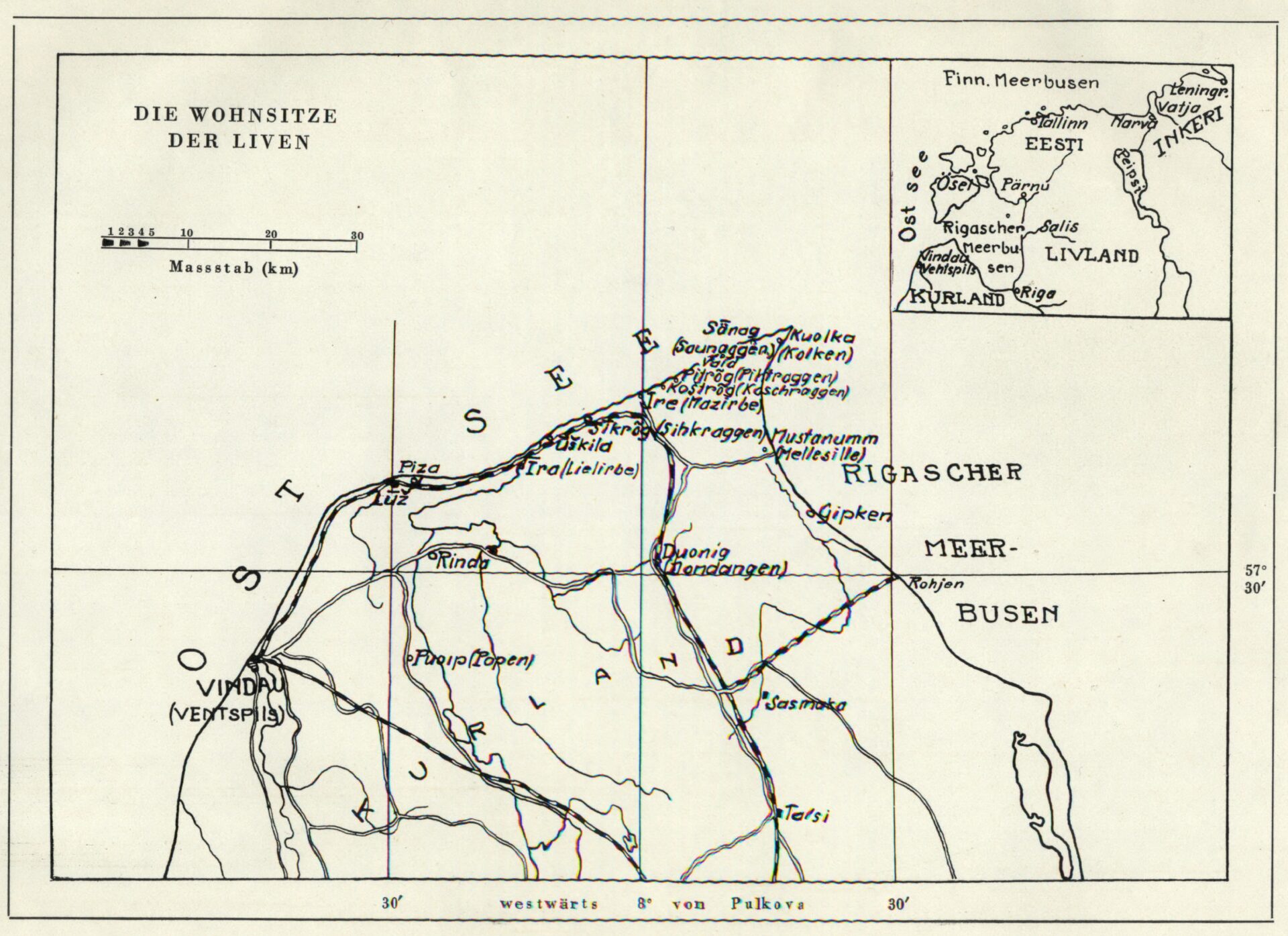
Livonian
4.2. Gramatik / Grammar
Local cases and adverbs, postpositions
Location is expressed using the local case forms of nominals. Of the productive cases, the illative, inessive, and elative express location. Of the unproductive cases, the allative, adessive, and ablative are used, e.g., with certain Livonian village names (Irē, Sīkrõg, etc.), but also with place names ending in mǭ ‘land’ (e.g., Ēstimǭ ‘Estonia’). (For more on noun cases, see Unit 3.) Location and finality are expressed with the supine or ma-verb forms, which also form a three-part series.
| Kus? | GOAL | Kus? | LOCATION | Kust(õ)? | SOURCE |
|---|---|---|---|---|---|
| Illative | Ma panāb sīe käppõ ’I am putting it in the cupboard’ | Inessive | Se um käpsõ ’It is in the cupboard’ | Elative | Ma võtab sīe käpstõ ’I am taking it from the cupboard’ |
| Allative | Ma broutšõb Ēstimǭlõ ’I am traveling to Estonia’ | Adessive | Ma jelāb Ēstimǭl ’I live in Estonia’ | Ablative | Ma um Ēstimǭld perīņ ’I am from Estonia’ |
| Supine | Ma lǟ’b vȯigõm ’I am going swimming’ | Supine inessive | Ma vȯ’ļ vȯigõmõs ’I was swimming’ | Supine elative | Ma tulāb vȯigõmõst ’I am coming from swimming’ |
Location is also expressed using adverbs and adpositions. These also form three-part series, distinguishing between going somewhere (Kus? ‘Where (to)’), being located somewhere (Kus? ‘Where’), and coming from somewhere (Kust(õ)? ‘Where (from)’). The table shows examples of words, some of which occur only as adverbs, while others occur also as postpositions.
| Kus? (GOAL) | Kus? (LOCATION) | Kust(õ)? (SOURCE) | Example |
|---|---|---|---|
| alā ‘under’ | allõ ~ al ‘under’ | aldõ(st) ‘from under’ | Rǭntõz sadīz lōdan alā ’The book fell under the table’ |
| i’lzõ ‘up’ | i’llõ ‘up, above’ | i’ld(st) ‘from above’ | Ve’l pǟva u’m i’llõ, ȭ’dõg ve’l kougõn ’The sun is still high, evening is still far away’ |
| je’ddõ ‘in front of, forward’ | je’dsõ ‘in front of’ | je’dst ‘from the front of’ | Tulgid je’ddõ! ’Come forward!’ |
| jū’rõ ‘(up) to’ | jū(r)s(õ) ‘at’ | jūst(õ) ‘(away) from’ | Irma tulāb aŗšt jūstõ ’Irma is coming from the doctor’ |
| kaŗŗõl ‘(to) herding’ | kǭŗal ‘herding’ | kǭŗald ‘from herding’ | kaŗŗõl lē’mi ’going herding’ |
| kilgõ ‘next to’ | kilgs(õ) ‘next to’ | kilgst ‘from next to’ | Kis istāb mi’n kilgsõ? ’Who is sitting next to me?’ |
| kōgaz ‘far away’ | kougõn ‘far away’ | kougõnd ‘from far away’ | Izā lekš kōgaz ’Dad went far away’ |
| le’žgõl ‘near, close’ | le’žgõl ‘near, close’ | le’žgõld ‘from nearby’ | Ta jelāb jõvāgõt le’žgõl ’He lives quite close’ |
| kuodāj ‘(to) home’ | kuo’nnõ ‘(at) home’ | kuo’ndõ(st) ‘from home’ | Läpš u’m kuo’nnõ ’The child is at home’ |
| pǟlõ ‘on(to)’ | pǟl(õ) ‘on’ | pǟldõ(st) ‘off, from’ | Kaš īekiz ra’j pǟldõst pȭrand pǟlõ ’The cat jumped from the chair onto the floor’ |
| sīņõ ‘(to) there’ | sǟl ‘there’ | sǟldõ(st) ‘from there’ | Ma jetīz ta sīņõ ī’ž ’I left him right there’ |
| sidāmõ(z) ‘into the middle of’ | sidāmõs ‘in the middle of, among’ | sidāmõst ‘from the middle of’ | Ta u’m mä’d sidāmõs ’He is among us’ |
| si’zzõl ‘in(to), inside’ | sizāl ‘in, inside’ | sizāld(õ(st)) ‘out of, from inside’ | Vȯrābõz tuļ pȭzõd sizāld vä’ggi knaš vakāks ’A squirrel came out of the bushes with a very beautiful basket’ |
| tagān ‘after’ | tagān ‘behind’ | tagānd(õ(st)) ‘from behind, around’ | Pi’ņ vaņţlõb nūrka tagānd ’The dog is looking around the corner’ |
| tǟnõ ‘(to) here’ | täsā ‘here’ | tästā ‘from here’ | Tästā jo’ug sǭņõ u’m ikš kilomētõr ’From here to the river it is one kilometer’ |
| u’lzõ ‘out, outside’ | ullõ ‘outside’ | uldõ(st) ‘from outside’ | Ullõ vȯ’ļ vä’ggi lem ja knaš āiga ’There was warm and beautiful weather outside’ |
The forms in the table show that there exists some variation (variants are given in parentheses). For example, ‘out of, from inside’ can be expressed as sizāld, sizāldõ, sizāldõst. The last of these is an example of how the productive elative case ending (-st) has been added to an old ld-final (ablative) local case form. The first and second columns also show the syncretism of forms expressing direction and location, e.g., tagān means both ‘after’ and ‘behind’.


